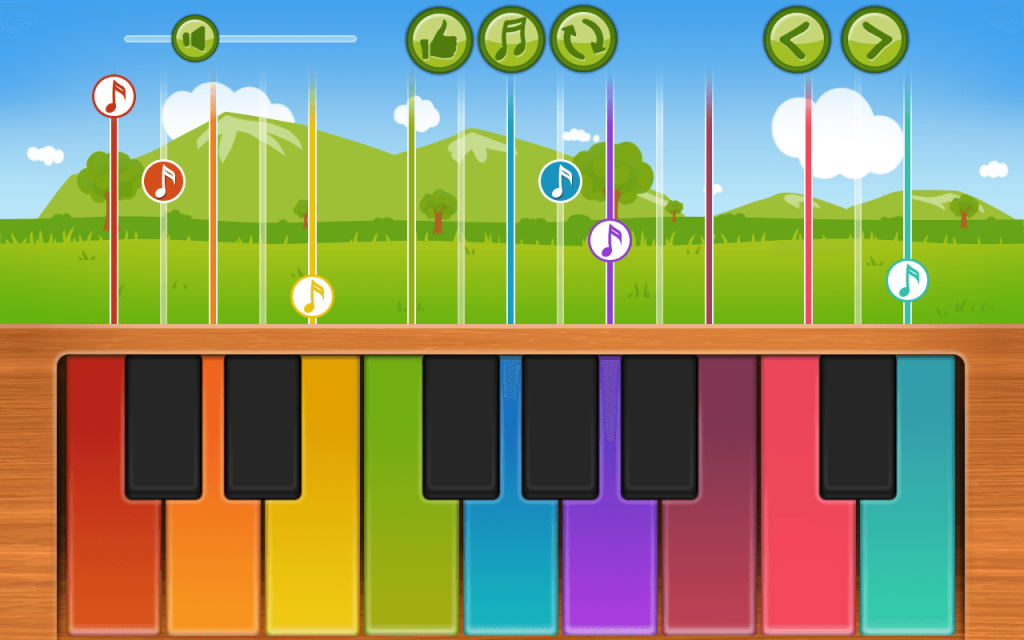Some of the best music games and activities for kids are making your own music, musical masterpiece, yes or no game, musical hide and seek, the passing game, musical chair, can you hear the sound?, musical quiz, microphone spin-off, antakshari, karaoke showdowns, dancing using props, tissue dance, musical statues, mood music, dance like an animal, party island and dancing and musical limbo.
As delightful as it sounds, music is a power food for the soul. Despite it being pop, rock, classical or even hip-hop; music can bring plenty of emotions as well as peace which helps to energize your senses. There have been studies which state the music training can lead to faster development of the brain. Even so, music can be pretty fun when being added to games which kids usually play.
We present to you below a list of fun music games where some may be complicated and some may not. However, regardless of which, all of them offer the same thing- fun!
Read More: 11 Best Running Games for Your Child
19 Entertaining Music Games for Children
Most of the people associate music with dancing. But is that the universal fact? Well, no. Read below to find out more.
Making your own music
This idea can be introduced in music classes. This game encourages children to pursue music in an entertaining and fun way.
You will need
- Colour Pens
- A lot of paper
How to play
- Create symbols and signify the sounds they mean.
- Put out these mandates on the board and get children to produce music using the symbols made.
- Let children show the music they made on the board while the others follow up with ‘notes’ to develop more music.
Musical masterpiece
This musical game is ideal to be played in classrooms or groups.
You will need
- Colour pencils and pens
- A computer or music player
- A lot of paper
How to play
- Colour pencils and a paper sheet should be given.
- Students should draw as the music starts and stop drawing when the music stops.
- Leave the paper and pens on their desks, shift to another desk and continue to draw and colour till the music stops.
- Continue to do so till you tell them to stop.
- Finally, they return to their desks and view the final art.
Note – you can place these instructions on a huge chart for kids to see and play.
Yes or no game
This musical game is a warm-up game which is suitable for a group of music students or even a choir.
You will need
- Area to play
How to play
- A conductor (parent or teacher) will play a few rhythmic phrases to start and children would need to repeat after.
- Replace the notes with ‘Yes’ or ‘No’. Children will have to sing the reverse of what you speak but in the same rhythmic fashion.
- To demonstrate, if you sing, “No, no, no, yes, no, yes, no, no”, then children will need to sing “yes, yes, yes, no, yes, no, yes, yes”.
Note – you can use either one or two words to make it confusing yet fun.
Read More: Fun at Home Toddler activities and Games
Musical hide and seek
This musical game can be played with items and is a good tool to help a child enhance his/her listening skills.
You will need
- Hiding places
- A musical device or toy
How to play
- The child needs to find the toy by hearing its music.
- Switch the music on and hide the toy somewhere for the child to find.
- As he/she progresses, make it complicated each time.
As the child plays more, he/she will get better in listening.
The passing game
This musical game is a common activity which can engage children for a long period.
You will need
- A gift
How to play
- Wrap the gift with many layers as you can. The more, the merrier.
- Between the layers, add in a small toy or toffee.
- Let the children sit in a circle. As the music starts, they pass the parcel. And when it stops, they stop passing.
- The child who holds the parcel when the music stopped should remove one layer to see if he/she receives a gift.
- The rest of them continue the game while the child moves out.
The game continues as long as the layers are unwrapped. Or you can include many parcels till there is only a single child left.
Musical chair
This musical game is another version of the usual regular musical chairs game and is played in a class to persuade recitation or reading.
You will need
- Chairs
- Music
- Space
How to
- Choose an activity where each child takes turns and do. Like solving a math problem or reading a book.
- Order the chairs in a circular motion and cue the music.
- The kids walk as long as the music continues and sit quickly in the closest chair when the music stops.
- The child who remains to stand solves a math problem on the boards or reads a para from a book.
This can be a fun activity to enable children to be active and attentive.
Can you hear the sound?
Can you figure out guitar tunes? How does a cello sound? Children can try out this game in order to learn and identify how each instrument sounds.
You will need
- Instrumental music
- Music player
How to play
- Play different instruments sound first.
- Then resume a song with clear sounds of instruments and ask whether if children are able to identify which instrument it is.
As you progress, you can ensure each level to be complicated than the last by adding not-so-distinct sounds.
Read More: 11 Interesting Dance Games for Kids
Musical quiz
A musical trivia? Yes, please! If you want to pursue a productive music class, then set questions related to tunes or musical notes. Or maybe a quiz on a child’s preferred bands or singers along with their songs.
You will need
- Gifts
- Questions
How to play
- A team event or individual event is ideal.
- When played in school or parties, divide into groups.
- This activity can revise music lessons and give gifts to children who get it right.
Microphone spin-off
Similar to spin the bottle, spin the microphone is a flexible game where you can change it to a way you want such as making it a truth or dare, a karaoke event or a quiz game.
You will need
- Activities or dares which kids can do
- A working microphone (wireless)
How to play
- Children should sit in a circle with a mic in the middle.
- One child spins the mic.
- As it stops spinning, whoever the mic points at should perform the activity or dare.
This can be an elimination game where a child moves out of the circle and new kids can join in later.
Antakshari
This is a well-known game played in India where it can be played in teams. It involves singing movie songs and you can change the rules as well.
You will need
- Microphone (non-compulsory)
- Area to play
How to play
- Establish rules which are needed to play without glitches.
- Firstly, the moderator will choose an alphabet letter. The first team would need to sing a song (not more than three verses) starting from the letter.
- The next team will need to sing a song which starts with the consonant of which the first team’s song concludes with.
- Again, each team will have to continue singing with the consonant that the prior team’s song concludes with.
- The team which cannot do so will lose points.
The team which has the highest amount of points wins. Variations can be done to make it interesting.
Karaoke showdowns
Being basic yet fun, karaoke is one activity which you can enjoy with friends and family.
You will need
- Karaoke songs – make sure songs are known by your child
- A sound system and a mic
How to play:
- List out the songs and place them in pieces of paper and place them in a box.
- Divide the players into teams.
- Your child, along with his/her partner, needs to sing the song correctly.
You can rate them on tone and tune but avoid judgements on their singing voices. To make it challenging, place songs which are not usual to them. This tests kids and their musical knowledge.
Now, shall we combine dancing and singing together and make it entertaining for children?
Read More: 21 Fun Music Games for Kids
Games which make you dance to music
If you desire to blend musical and physical activity together, these are some ideal games to deal with.
Dancing using props
Dancing with props enables creativity to develop.
You will need
- Props such as balloons, pom-poms, hats, teddy bears, flowers, ribbons and wigs etc.
- Area to dance
- Music player
How to play
- Use the area as a child-friendly dance floor.
- Put the props on a table to one side of the room.
- As the music starts, kids can run to the table and choose a prop. Selecting a random prop is alright as long as it is safe to dance with.
- Dancing anyway is suitable while using the prop accessory.
- As the music ends, place the props on the table.
- As the music starts again, kids can select another prop and continue dancing.
Tissue dance
A tissue dance signifies more of a balancing act but less of a dance session. However, it is still fun!
You will need
- Area to dance
- A tissue box
- Music player
How to play
- Place a tissue on a child’s forehead.
- As the music starts, they should begin standing and move to the dance floor while ensuring the tissue doesn’t fall.
- If the tissue does fall but if the child catches it before it touches the ground, they can place it on their heads and resume.
- If the tissue does fall and not caught, the child is out.
- The last child dancing with the tissue on the head is the winner.
Musical Statues
Musical statues can be entertaining for kids of all ages.
You will need:
- Area to dance
- Music player
How to play:
- Cue the music and let the children dance.
- As the music stops, the children should stop like statues.
- Children need to stand like for a minute or so, and if anyone moves or does any action while there is no music, he/she is out.
- When the music plays, they can dance again.
Mood music
This is a perfect method to show kids different music genres along with multiple emotions connected to them.
You will need
- Music player
- Song collection showing different emotions such as sadness, anger, happiness, and silliness
- Area to dance
How to play
- Choose songs which are suitable for the child’s age.
- Explain the game to children and let them know how they would act when they are either sad, happy etc.
- Then, let them know to dance to the song according to the mood which will be mentioned before resuming the music.
- So for a joyous song, kids should jump and move with all whereas, for a sad song, they just sway away.
- They could dance aggressively or silly when they feel angry.
Dance like an animal
Yes, this musical game needs children to dance literally like an animal
You will need
- Animals/birds/reptiles chart
- Area to dance
- Songs of many genres
- Music player
How to play
- Place the chart where all the kids can see it.
- If children are too young, you might need to explain animal traits on the chart before you start to begin the game. Things such as animal movements, the pace it moves, the sounds it makes and any other peculiar traits it has.
- To demonstrate, a child who chooses a dog would need to be on all fours and also bark in between when swaying or dancing.
- Keep changing the genres with different paces (slow to fast and vice versa) and resume the music.
Party island
This musical game is common amongst teens and ideal for couples. However, it is been modified for kids of all ages.
You will need
- Music player
- A lot of space for dancing
- Newspapers
How to play
- The child would need to use spatial intelligence along with his/her capability to balance in order to win.
- Each child receives a newspaper sheet and adequate space between to dance with ease.
- As the music starts, kids will place the sheet on the floor and dance on it. They shouldn’t touch the floor when the music is playing.
- After some time, halt the music and ask the kids to fold the sheet precisely in half and place it back on the floor.
- As the music resumes, kids will need to dance on the folded paper but not step on the floor.
Dancing
This can be a musical group event for children of all ages. Just provide kids with props, ask them to choose their favourite choice and practice a dance routine.
You will need
- Music player
- Area to dance
- Props and accessories if available
How to play
- Divide the children into groups. Provide them with props.
- Let them choose their favourite songs and practice a dance routine using the props.
- Have a competition between the teams and let the best performance win.
Musical limbo
Limbo is a game which checks how flexible the body is. Add music and limbo becomes extremely fun! As you play musical limbo, not only do you need to move dance under it as well.
You will need:
- A beam or long stick
- Music player
- Area to play
How to play:
- Requires two chaperones that can hold the stick at a height where kids can move underneath it with ease.
- There are two rules only: kids need to dance to move and they shouldn’t touch the stick.
- Play the music and let the kids, one after the other, and move under the stick.
- Any kid who touches the pole or even fails to dance while moving under is out.
- After the first round, lower the beam a little and continue the routine.
- Repeat until there is only one child remaining. The child who holds on till the end wins!
If you want more, you can think about many ways in which you can join music with the common games like hopscotch, rope jump etc. Adding in music to normal tasks or even household tasks can make them more entertaining to do and less boring.













